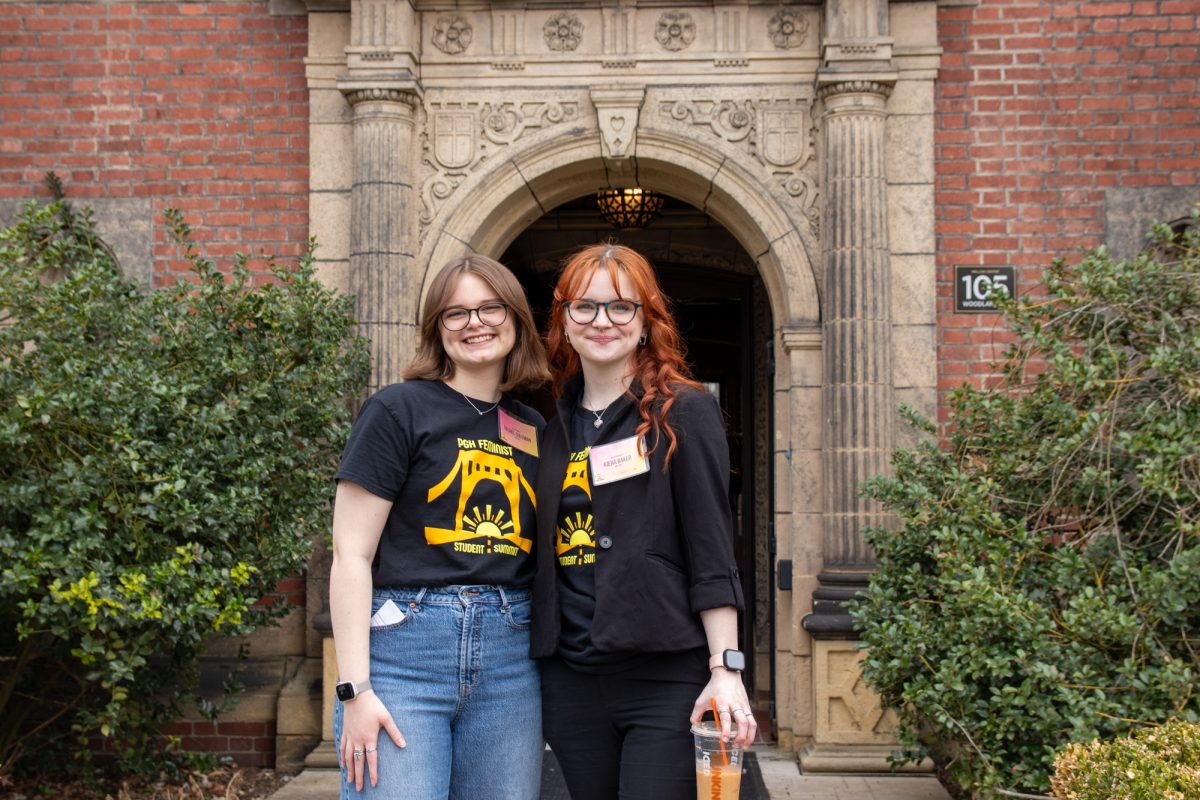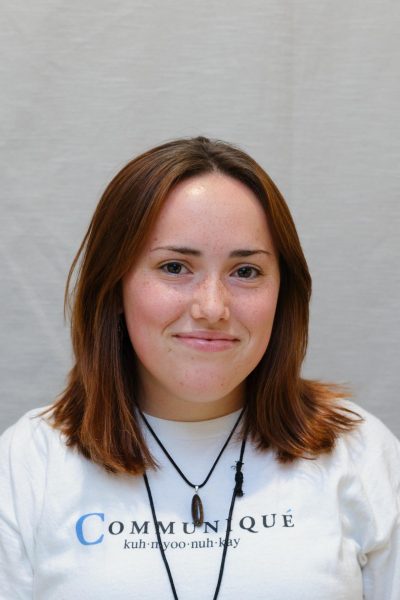The Pittsburgh Feminist Student Summit was held on Chatham’s campus in Mellon Center on March 29, hosting college students from across the greater Pittsburgh area to network, learn and share their feminist work with peers.
The event was organized in five months by a group of Chatham students in collaboration with the Women’s Institute. The idea was born from a class taught by Dr. Jessie Ramey, who hosted guest speaker Dr. Laura Lovett, head of Gender, Sexuality, and Women’s Studies at the University of Pittsburgh. The summit was later dedicated to Dr. Lovett following her passing in March.
Mary Stanton ‘27 was involved in initial conversations with Dr. Lovett. After Rachel Coleman ‘25 and Kiera Baker ‘25 had spoken with Dr. Lovett, they got the ball rolling. They connected with the Women’s Institute and a number of feminist organizations across campus such as the Chatham Feminist Coalition and Planned Parenthood Generation Action and started planning.
“After that initial conversation in class, students expanded their vision to an event that would build feminist community with university students throughout the Pittsburgh region,” Dr. Ramey said. “I was happy to support the event by having our student leadership team organize the Summit as an official part of their work with the Women’s Institute.”
The meetings sometimes had up to twelve students to assist in planning, but a core group of Coleman, Baker, Arden Begley ‘25 and Sydney Altfather ‘25 did the brunt of the work with help from Molly Comcowich ‘26, Anja Forberger and Haley Drass ‘25 among others. The group, including Dr. Ramey, described it as “horizontal organizing” – a collaborative effort in which there were no superiors or positions of authority. All who were involved contributed their ideas, resources and efforts.
“We really made an effort to make sure that those who couldn’t be in the room still had a voice in the matter and still had the chance to weigh in on every single piece of information we put out there and every decision we made,” said Baker.
Close to 100 students from colleges in Pittsburgh and surrounding areas attended the summit, representing their respective academic programs or student organizations in the different events of the summit – lightning talks, tabling, networking and group discussions. There were also rooms dedicated to displaying feminist student artwork, crafting and decompressing in a quiet space.
The organizers recruited a number of “impact hosts,” Chatham students who volunteered their time to aid in running the event – whether it be through moderating discussions, guiding non-Chatham attendees for where they should go or getting people name tags.
“The goal of this was to be student-led and student-focused,” Coleman said. “It was just so cool to see once we got there like the people we [got to table] and the art installations we got. It was a structure we set up. I was like dang, I’m the one who got these people here or Sydney got these people here.”
Students from local colleges were formally invited by the organizers because of their proximity to Chatham and access to a bus pass, ensuring that a free option for public transportation was available. No admission fee was implemented to keep the event as accessible as possible. These were details that were discussed at length and in advance to make sure the summit ran smoothly.
“We had a team of people who were consistently able to commit to planning this [event],” Coleman said. “But I think the contributions of the people who popped up every once in a while to a meeting shouldn’t go unnoticed. They brought up perspectives and ideas that we hadn’t thought of. It wouldn’t have been as successful without every tiny contribution.”
With most of the principal organizers graduating this semester or in the fall, they aim to pass the baton onto the next group of Chatham students to continue hosting this event in the future.
“Every tradition needs a foundation, it needs a team to start it, and that’s us,” Altfather said. Coleman added that by supporting this event, Chatham is showing that they hold their values.
Comcowich expressed her determination to ensure the event happens again next year.
“This was the most Chatham event I’ve ever been to. When I was touring this campus, that’s what I envisioned would be happening – the kind of events I’d be going to and the kind of community building and organizing that I would be doing,” Comcowich said. “Even just within the organizing committee, the camaraderie and feminist networking that’s been done is impactful and lasting and I’m very excited to be a part of it.”
The organizers reiterated the importance of collaboration.
“Feminist community building was also the biggest aspect of why we wanted to make the summit,” Begley said. “I hope that’s what it looks like for next year, increasing that outreach and increasing the attendance to build that feminist community.”
After last year’s presidential election led to concerns around the state of women’s rights, feelings of discouragement shifted into motivation to continue on with creating the summit.
“When it was easy to throw in our hats, I think we dug our heels in deeper,” Coleman said. “Community building and connecting with each other is important for creating resistance and perseverance to travel the rough road ahead for change in the face of oppressive forces.”
Ramey echoed Coleman’s sentiment – events like this one are forms of resistance that pave the path toward gender equity, one of the founding principles of the university and more specifically, the Women’s Institute.
“Research shows that some of the best ways to promote women’s leadership and gender equity are networking, mentoring and role modeling,” Ramey said. “Events like these do all of these things and more.”
The prevailing feelings expressed by both organizers and attendees of the summit: joy and hope.
“Feminist community is vital to the preservation of social justice movements, and I feel honored to have played a role in the Pittsburgh community,” Baker said. “Resistance is joy, and [at the summit] we used joy to spread our message.”
Correction, April 16: The original organizing team has been updated. Mary Stanton ‘27 was involved in initial conversations with Dr. Laura Lovett.



